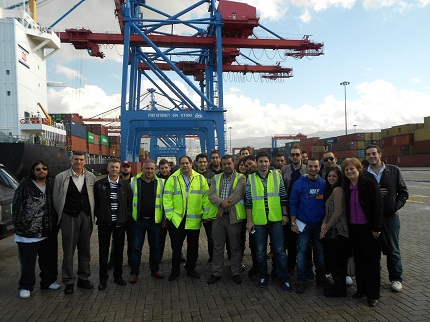Transforming Educational Spaces
Rather than playing the role of the dispenser of wisdom, the instructor often allows the students to produce through their activities the grist for the learning experience. For Mrs. Nadia Azzam, instructor of Marketing at the School of Business at LAU, such an approach in the classroom is an important proposition. Providing her students with the chance to experience a direct application of the concepts and theories covered during the International Marketing class, a field trip to Beirut Port was organized on the 8th of December, 2012 as part of creating meaningful learning communities and enriching the student experience.

“The idea came as I was trying to widen the exposure of our ‘future marketing managers’ to hands-on situations and to open doors for them to meet, ask questions and network with key people in the field”, Mrs. Azzam explained, as she and Dr. Said Ladki, chairperson of Hospitality and Marketing department at the Business School, accompanied the students throughout the visit.
Upon arrival at the Beirut Port premises, representatives from the Lebanese Security Forces and Mr. Maroun Abi Aad, Container Terminal Coordinator at Port of Beirut, guided the students through the different processes. The visit started at the Control Room Center (managed by Beirut Container Terminal Consortium) where the Terminal Manager, Mr. Segean Jabbour, an LAU graduate, explained how they operate, maintain and manage the arrivals and departures of the vessels to and from Beirut port. He stressed on the importance of accurate communication with the various ports to schedule arrival of the vessels, as well as the proper logistics management to secure sufficient space and cranes for downloading and loading containers. Mr. Jabbour’s team explained multimodal facilities, transit and transshipment activities.
The last stop was at the Lebanese Customs Authorities where the chief inspector explained in detail the responsibilities of the Customs in controlling entry of goods to Lebanon and the region, in securing proper documents, formalities and payment of tariffs, as well as in preventing fraud and unethical corruption.
A student, Ziad Ramadan, commented: “The field visit to Beirut Port was a great opportunity to witness real business practices. I had never imagined that an employee’s job at Beirut Port would be so detail-oriented. We had the chance to network and ask people with expertise several questions which enriched our knowledge and diversified our perspective. Also, getting outside of the classroom was a nice experience for everyone in class, we formed a unique learning spirit”.
Another student, Mohammad Abla added, “the field visit was very informative. It clarified how the goods we consume daily reach us.”
Transforming educational spaces from restraining to engaging places takes intentional thought and design. Experiential learning requires active engagement of the students as opposed to passive engagement commonly associated with teacher directed instruction. Such activities help students become more engaged in the learning process as they feel positive about the learning experience and perceive a great deal of value in what they have learned.